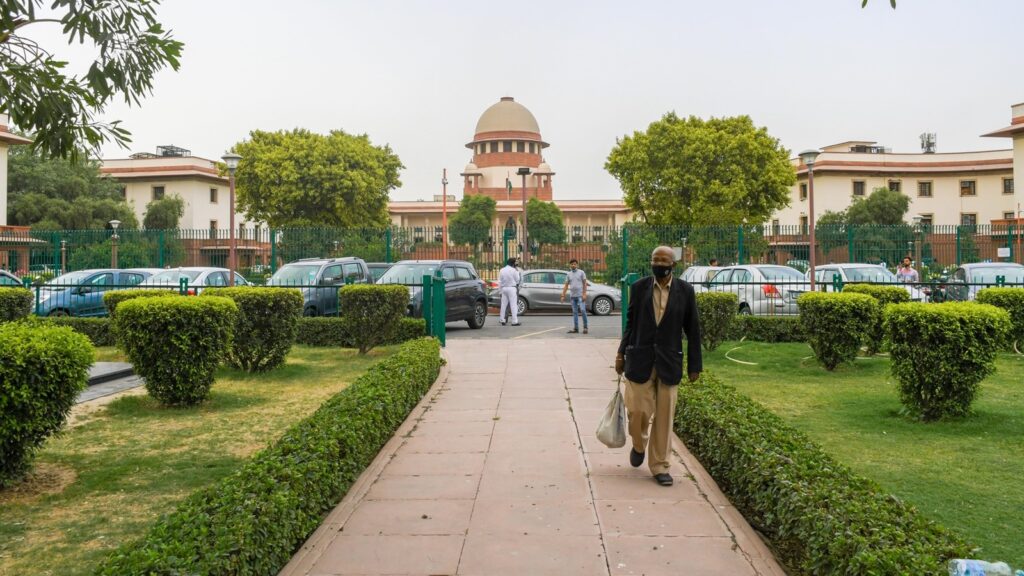The Supreme Court is set to pronounce its verdict on the Constitutional validity of the Waqf (Amendment) Act, 2025, on Monday.
The court has heard petitions filed by several Opposition parties, including the RJD and the AAP, a non-aligned party such as the YSR Congress Party (YSRCP), and several Muslim organisations, all of whom have argued that the Act violates Constitutional guarantees of minority rights. The Centre, on the other hand, has defended it as a necessary measure to bring accountability and transparency in the management of Waqf properties.
The legislation, which was first introduced in 2024 and subsequently sent to a 31-member Joint Parliamentary Committee (JPC) headed by BJP MP Jagadambika Pal, has sparked some of the fiercest parliamentary debates in recent years and triggered widespread protests across the country. The JPC meetings too were stormy with Opposition MPs boycotting a few sittings. The panel submitting its report also led to a furore after Opposition members alleged that the amendments suggested by them were not incorporated into the Bill.
The 2025 Act was introduced in the Lok Sabha on April 2 and cleared the House the same day with 288 MPs of the BJP and its allies supporting the Bill, while 232 voted against it.
A day later, it was passed in the Upper House following a 14-hour debate but with a much thinner majority. While 128 MPs voted in favour of the Bill, 95 voted against it.
President Droupadi Murmu gave her assent to the Bill in mid-April and since then, the law has been notified in many BJP-ruled states while Opposition-ruled states have resisted its implementation.
What changes does the Bill bring in?
The 2025 law makes some key and contentious amendments to the 1995 Waqf Act, including giving the Centre enhanced oversight of state Waqf Boards, mandating digitisation and GIS mapping of all Waqf properties, providing for women and non-Muslim representation on Waqf Boards, and imposing stricter rules against leasing or selling Waqf land at undervalued rates. Currently, there are around 8.8 lakh Waqf properties, of which around 73,000 are in dispute.
The government’s stand
Defending the need to amend the 1995 law, BJP leaders told the Lok Sabha:
Amit Shah (Union Home Minister): He said the Bill would not have a retrospective effect. “It clearly states that the law will come into effect after the notification is issued.”
Jagadamika Pal (BJP MP and JPC chairperson): Saying there was nothing unconstitutional about the Bill, he said, “Poor Muslims, Pasmandas and widows will be benefited… The way the Triple Talaq Bill benefited (Muslims), when the new Waqf Bill comes, it will also lead to benefits… If there is a mosque or Idgah somewhere, it will remain in Waqf.”
Kiren Rijiju (Minority Affairs Minister): He said the words Constitutional and unconstitutional should not be used lightly and threw light on the JPC’s working. “A total of 284 delegations have put forward their views and suggestions. Waqf Boards of 25 state governments have submitted their representations, along with legal luminaries, scholars and community leaders.”
Opposition’s objections
A united INDIA bloc opposed the Bill, with its leaders stating their arguments.
Gaurav Gogoi (Congress Deputy Leader in the Lok Sabha): He termed the Bill “an attack on Parliament and the Constitution. “The government has four key objectives behind introducing the Bill and all are targeting the Muslim community.”
Asaduddin Owaisi (Hyderabad MP and AIMIM leader): Tore a copy of the Bill in protest and said it violated Article 26 of the Constitution. “If the amendment comes into effect, only ancient temples will be protected, not mosques. I tear this law. It is an unconstitutional law,” he said.
Imran Masood (Congress MP): Saying that the Bill “completely undermined Right to Equality” and infringed upon religious freedom, he questioned the definition of a “practising Muslim”. “What is your definition? All Muslims do not offer namaz five times, all Muslims do not observe roza,” he said.
Other MPs from DMK, TMC, AAP, RJD, Left parties and YSRCP also opposed the Bill.
The Bill was also debated in the Rajya Sabha, where Opposition MPs again pressed for amendments. The Congress, DMK, CPI(M), TMC, RJD, AAP, BRS, and YSRCP all opposed the Bill, arguing that it centralised control and undermined minority autonomy.
All amendments were defeated, and the NDA, with the crucial support of its two largest allies — the JD(U) and the TDP — and other NDA partners, secured the Bill’s passage.
The aftermath
The legislation was followed by sharp state-level responses. The Kerala, Tamil Nadu, and Karnataka Assemblies passed resolutions declaring the Act unacceptable, while a discussion on it was refused in the Jammu and Kashmir Assembly.
In Bihar, the RJD demanded that JD(U) reverse its support, while Telangana saw the Bharat Rashtra Samithi (BRS) and AIMIM organise protests in Hyderabad. Protests were also held against the law in Delhi, Lucknow, Kolkata, Malappuram and Patna, with Muslim organisations such as the All India Muslim Personal Law Board (AIMPLB) and the Jamiat Ulema-e-Hind mobilising crowds and calling for the law to be rolled back.
By late April, multiple petitions were filed in the Supreme Court by the Congress, AAP, RJD, AIMIM, IUML and other groups. The petitioners argued that the Act violated Articles 25 to 30 of the Constitution that guarantee freedom of religion and the rights of minorities to manage their own institutions. They said the inclusion of non-Muslims on Waqf boards and enhanced central oversight amounted to unconstitutional interference in religious affairs.
The court has heard arguments on whether central oversight and non-Muslim representation violate the Constitutional principle of religious autonomy, and whether the Act discriminates against Waqf institutions compared to the protections available to temple and church trusts.

